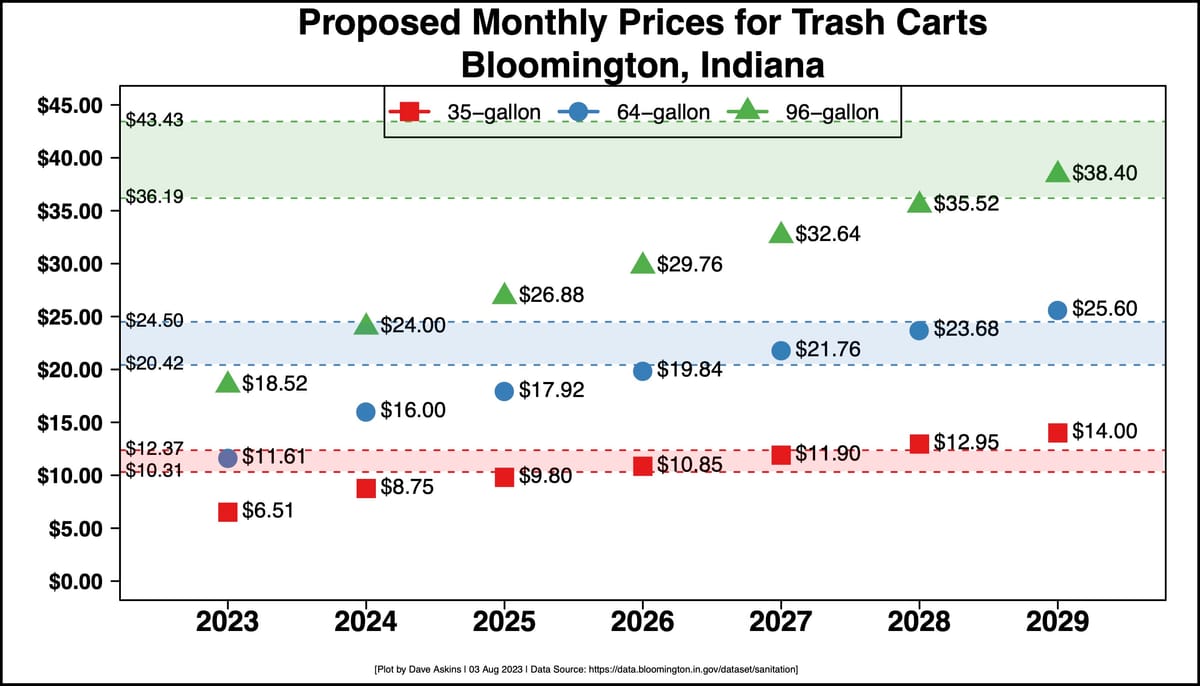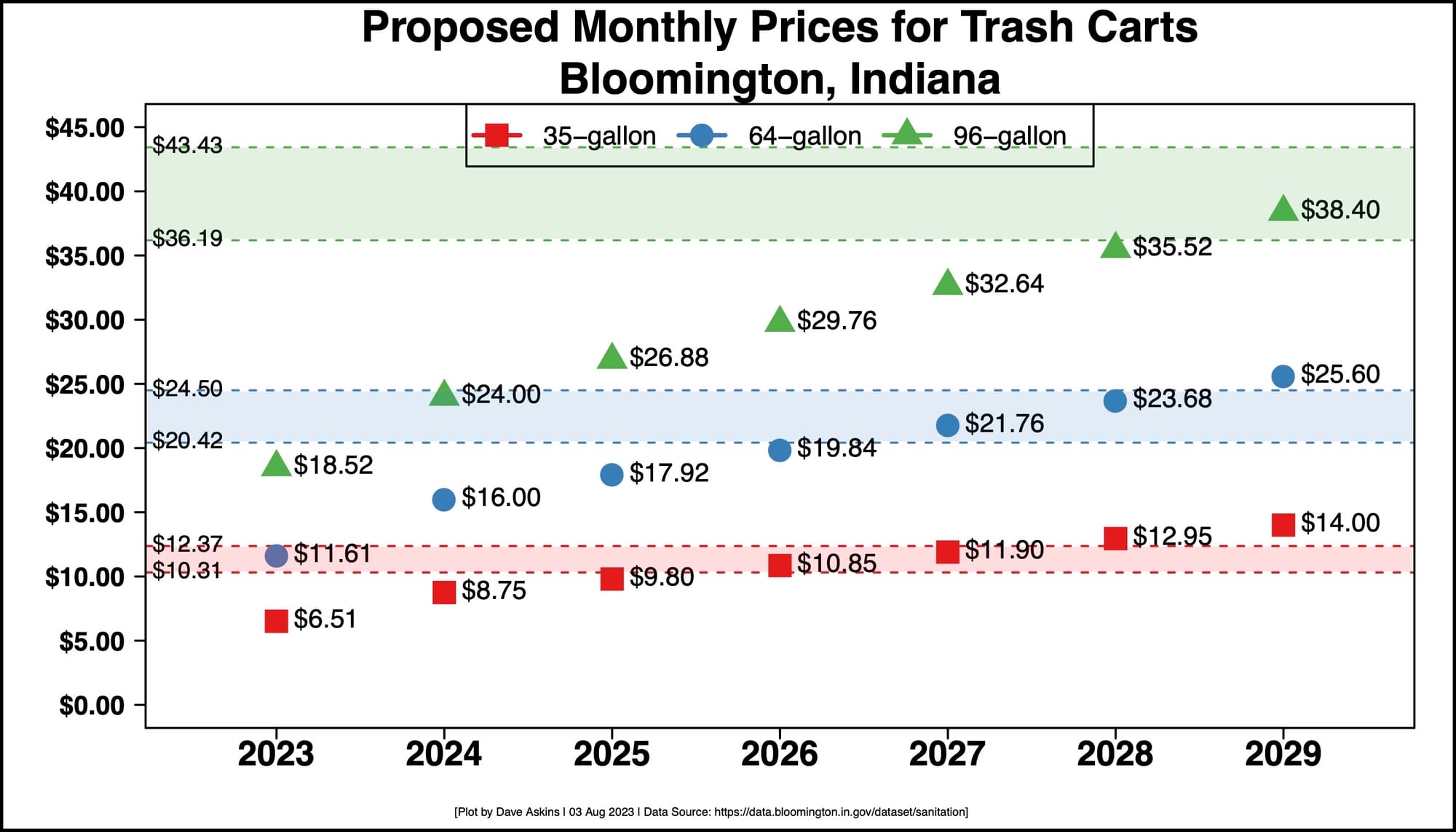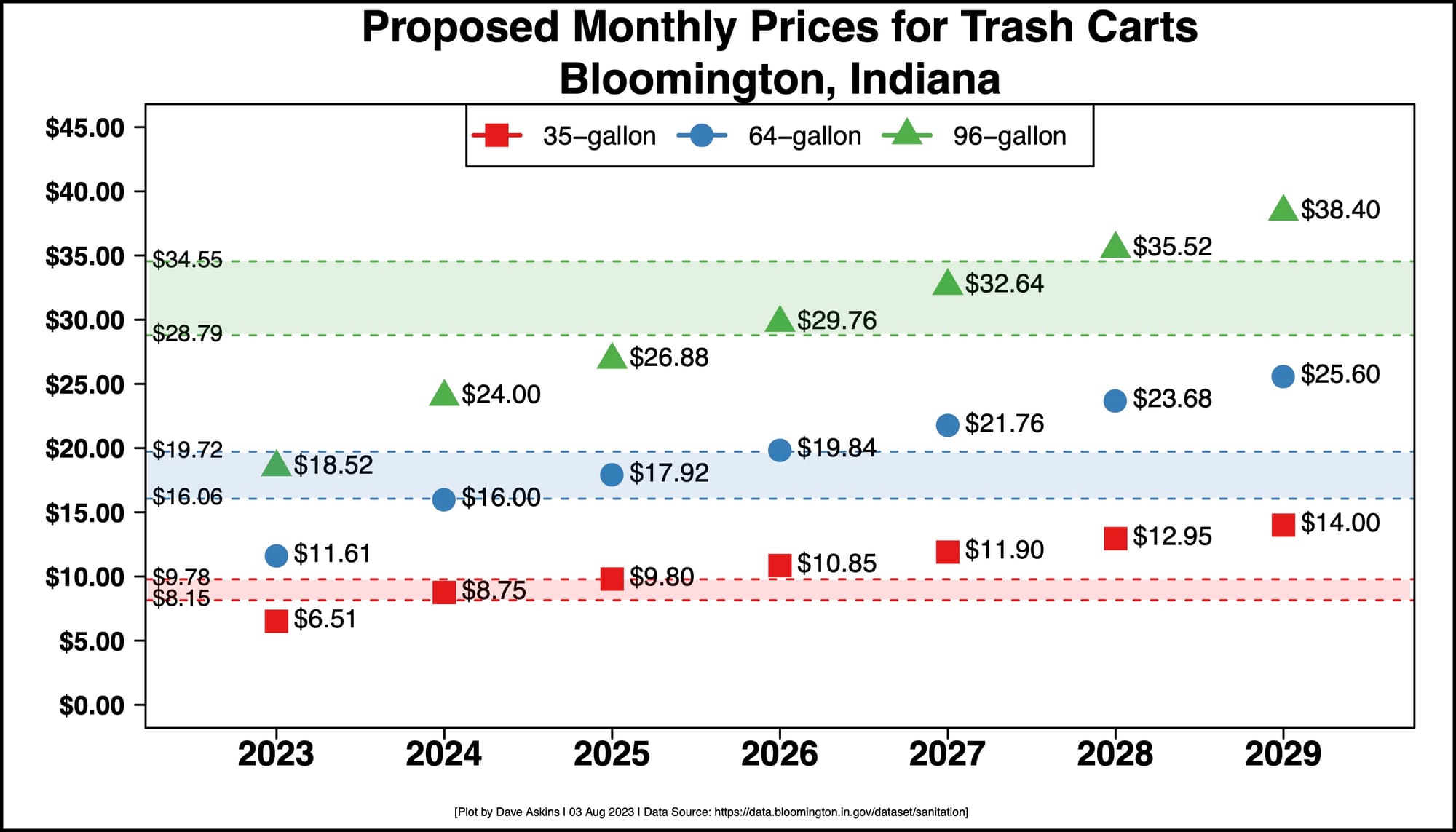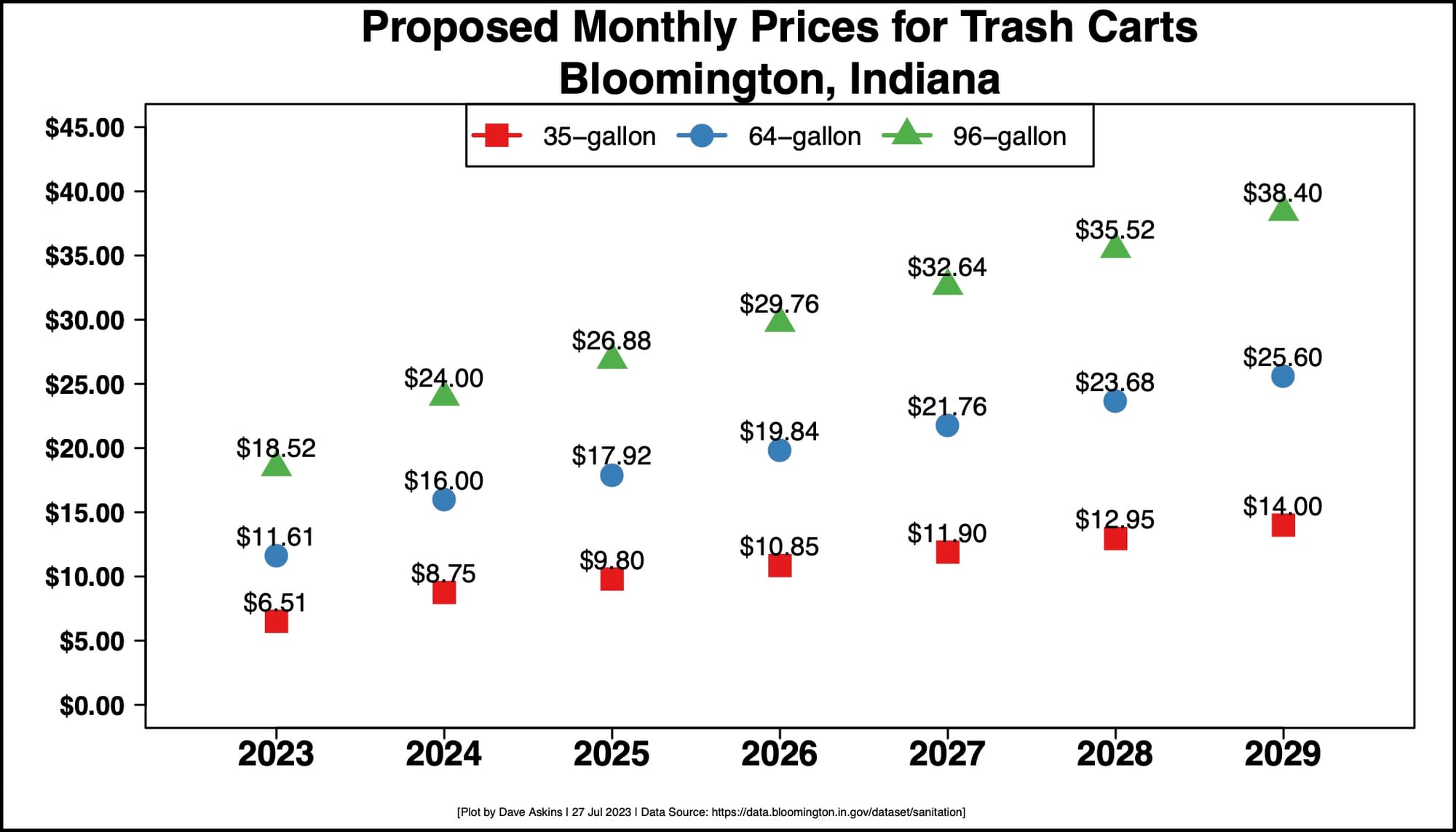Vote on trash fee increase in Bloomington put off until Aug. 9




It was about three years ago, in April of 2020, right at the start of the COVID-19 pandemic, when trash cart fees paid by Bloomington residents were last increased.
After voting down a proposed increase in mid-June, Bloomington’s city council has now postponed a vote on a revised proposal. On Wednesday, the council voted 7–0 to postpone the question until Aug. 9.
Absent from the meeting were Susan Sandberg and Dave Rollo.
The trash cart price is proposed to increase starting in 2024.
The increase three years ago was relatively incremental. The 35-gallon cart size, which is the smallest option, increased from $6.22 to $6.51 per month, which is 4.6 percent more. That put the cost at the top of the range that is currently spelled out in city code.
This time around, the proposed increase is substantial, because it’s designed to eliminate general fund support for curbside collection of trash and recycling. The initial increase for a 35-gallon cart would go from $6.51 to $8.75 per month. That’s a 34-percent increase.
The price is then proposed to increase each year through 2029. That approach eliminates the idea of specifying a range of prices in city code, and allowing the three-member board of public works to set the specific price within the range.
The question nearly came to a vote on Wednesday, before the council decided to postpone the proposed increase until next week.
Council president Sue Sgambelluri had just asked the city clerk to call the roll on the question, when Matt Flaherty raised his hand to ask that the possibility of postponement be considered.
Up to that at point, Flaherty had not participated in the deliberations.
But the administration’s proposal was identical, except for one minor difference, to an amendment that he and Steve Volan had drafted, but not moved at the council’s June 14 meeting. The only difference was that the Volan-Flaherty amendment specified a pricing schedule only through 2028.
During deliberations, Kate Rosenbarger and Isabel Piedmont-Smith indicated they would be supporting the fee increase.
Jim Sims and Ron Smith indicated they would not be supporting the proposed increase.
The deciding vote would have been cast by president Sue Sgambelluri, who had not indicated which way she was leaning on the question.
So at the point when Flaherty made his gambit for postponement, the outcome of the vote was unclear. Asked by The B Square after the meeting which way she would have voted, Sgambelluri indicated that when she asked for the roll call, she had still been in the process of deciding.
The amount of general fund support for curbside waste collection (trash and recycling) is reflected in the interfund transfer amounts for the solid waste fund. In past years, the amount of general fund support has been about $1 million.
Here are the numbers for the interfund transfer for past years, as recorded in the city’s online financial system: $1,075,658 (2016); $1,402,445 (2017); $919,786 (2018); $985,625 (2019); $1,009,620 (2020); $978,492 (2021); $1,107,486 (2022).
So far this year, $696,888 has been transferred into the solid waste fund.
Flaherty, Rosenbarger, Volan, and Piedmont-Smith, have framed the issue of general fund support as one of equity—between residents who live in buildings with four or fewer units (including single-family houses), and those who live in larger multi-family buildings.
Bloomington offers curbside waste collection service only to buildings with four or fewer units. Currently, that operation gets general fund support to make up for whatever the trash cart fees don’t cover. That allows residents to pay less for curbside waste collection than they would otherwise have to pay, if the fees covered the whole cost. The argument goes like this: That’s not equitable, because residents of multi-family buildings are not being provided with a similar amount of support to defray their costs.
Sims and Smith see trash collection as a basic city service that should receive general fund support.
On Wednesday, Sims and Smith both pointed to the increase to the local income tax (LIT) that the city council enacted last year, which means an additional $16 million in annual revenue to city government.
Smith said the increase in the LIT should mean that the council would “hold the line” on issues like the trash cart fees.
In making his bid to postpone, Flaherty picked up on the glimmer of a possibility that Sims had indicated for some kind of trash fee increase that Sims might support. Sims had said, “So there’s going to be some subsidy, I think. I think we’re just…debating how much, maybe.”
Sims first reacted to Flaherty’s bid to postpone in a way that suggested he was against continuing to deliberate on the issue next week. “To me, this is a basic city service. So we’re still talking about compromise on something that I don’t think we should compromise on,” Sims said.
But Sims eventually called Flaherty’s suggestion to postpone a “decent idea,” saying that he would be willing to entertain it. Volan immediately moved for postponement, but Sims said he wanted to hear what Smith had to say on the topic. Smith responded by seconding Volan’s motion.
Asked by Piedmont-Smith how he felt about the motion to postpone, public works director Adam Wason did not mince words. He led off by saying, “I would prefer a vote tonight.”
Wason also pointed out that the department of public works is starting a busy period, as rental units are turning over in August. The proposal that was in front of the council was, Wason thought, the kind of compromise the council was looking for.
Wason also pointed out that five different options were presented to the council in June, with two amendments drafted by the council.
Besides the amendment drafted in June by Flaherty and Volan, Sgambelluri had also drafted one. She went as far as to move it to a vote in June. It failed with support from just three councilmembers: Sgambelluri, Smith, and Sandberg.
Sgambelluri’s amendment had stuck with the approach of specifying a range, but at lower points than the administration’s proposal.
Sgambelluri’s proposal also shared the administration’s June proposal for a variable price per gallon, depending on cart size. The current proposal uses the same price per gallon for all three cart sizes.
Tables: Proposed Trash Cart Fee Increases (Ord 23-14)
| Size (gal.) | 2023 | 2024 | 2025 | 2026 | 2027 | 2028 | 2029 |
| 35 | $6.51 | $8.75 | $9.80 | $10.85 | $11.90 | $12.95 | $14.00 |
| 64 | $11.61 | $16.00 | $17.92 | $19.84 | $21.76 | $23.68 | $25.60 |
| 96 | $18.52 | $24.00 | $26.88 | $29.76 | $32.64 | $35.52 | $38.40 |
| Size (gal.) | 2023 | 2024 | 2025 | 2026 | 2027 | 2028 | 2029 |
| 35 | NA | 34.41% | 12.00% | 10.71% | 9.68% | 8.82% | 8.11% |
| 64 | NA | 37.81% | 12.00% | 10.71% | 9.68% | 8.82% | 8.11% |
| 96 | NA | 29.59% | 12.00% | 10.71% | 9.68% | 8.82% | 8.11% |
| Size (gal.) | 2023 | 2024 | 2025 | 2026 | 2027 | 2028 | 2029 |
| 35 | $0.186000 | $0.250000 | $0.280000 | $0.310000 | $0.340000 | $0.370000 | $0.400000 |
| 64 | $0.181406 | $0.250000 | $0.280000 | $0.310000 | $0.340000 | $0.370000 | $0.400000 |
| 96 | $0.192917 | $0.250000 | $0.280000 | $0.310000 | $0.340000 | $0.370000 | $0.400000 |
| Year | GF Subsidy | 35-gal | 64-gal | 96-gal | Revenue |
| 2023 | $1,000,000 | $6.51 | $11.61 | $18.52 | $1,688,606.88 |
| 2024 | $1,000,000 | $8.75 | $16.00 | $24.00 | $2,272,824.00 |
| 2025 | $800,000 | $9.80 | $17.92 | $26.88 | $2,545,562.88 |
| 2026 | $600,000 | $10 85 | $19.84 | $29.76 | $2,818,301.76 |
| 2027 | $400,000 | $11.90 | $21.76 | $32.64 | $3,091,040.64 |
| 2028 | $200,000 | $12.95 | $23.68 | $35.52 | $3,363,779.52 |
| 2029 | $0 | $14.00 | $25.60 | $38.40 | $3,636,518.40 |
Chart: Aug. 2 proposal contrasted with Sgambelluri’s June 14 amendment

Chart: Aug. 2 proposal contrasted with administration’s June 14 proposal





Comments ()